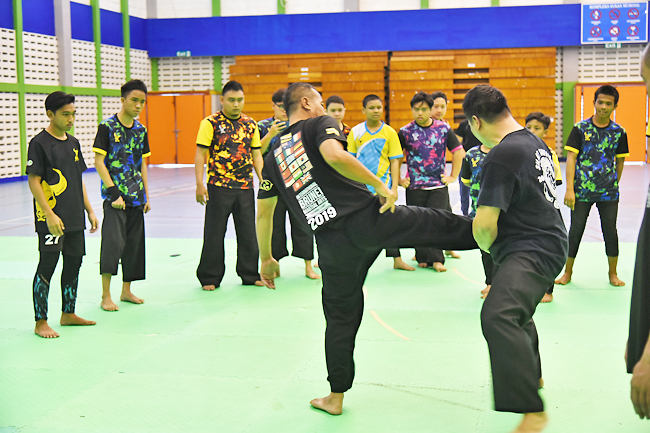As a traditional sport deeply rooted in the rich cultural heritage of the Malay world, pencak silat has been passed down through generations, embodying a legacy must be upheld, maintained and dignified.
The martial art, with its origins in the Malay Archipelago, holds a special place in the traditions of countries such as Malaysia, Indonesia and Thailand.
Pencak silat is more than just a form of martial arts; it is a practice that relies on a combination of self-defence skills, including repelling and attacking with hands and feet, as well as showcasing proficiency with weapons, particularly daggers and spears.
The blend of physical prowess and cultural expression has been a vital part of the heritage in these regions, symbolising not just combat techniques but also a way of life and a means of storytelling through movement. In recent years, the popularity of pencak silat has soared, transforming it from a traditional practice into a rapidly growing sport contested at the championship level on international stages.
The global expansion of pencak silat can be seen in the increasing number of competitions and the diversity of participants from around the world, reflecting its universal appeal and adaptability. The sport’s evolution has reached a significant milestone with top officials and advocates pushing for its inclusion as an Olympic sport.
The recognition would not only elevate pencak silat to new heights but also honour its historical and cultural significance, bringing its rich traditions to a global audience.


The recent updating of the rules and regulations guidebook by PESILAT, the international governing body for pencak silat, has ushered in a new era of knowledge and clarity for all participants, including the athletes and the jury.
In the Sultanate, the Brunei Darussalam Pencak Silat Federation (PERSIB) has disseminated these new rules through briefings for the local community to prepare them for both domestic and international competitions.
To compete, each participant must fully grasp the sport’s rules and guidelines, as this is a mandatory requirement.
Performing a pencak silat act is a dynamic display of skill, incorporating a range of movements, especially kicking techniques. These techniques employ different parts of the leg to deliver powerful strikes, each aimed at specific targets with precision and finesse.
Therefore, the martial artist must master these kicking techniques to outmanoeuvre and overcome their opponents in the heat of competition.
Among the accepted kicking techniques in a martial artist’s repertoire is the front kick, also known as the straight kick, commonly used when confronting an opponent.
In addition to kicking, pencak silat encompasses various techniques such as the horse stance, striking, blocking, cutting and more.
Several prohibitions in pencak silat are strictly enforced to ensure safety and fairness.
These include targeting prohibited areas like the neck and head, which can cause unnecessary injury; intentionally throwing the opponent out of the court; attacking with the head; initiating an attack before the signal to fight is given; and engaging in behaviours like biting, scratching, grasping, spitting or hurling abuse.
Producing efficient and high-quality martial artists requires rigorous training, strict discipline and guidance from an experienced trainer with extensive knowledge.
To gain a deeper understanding of the sport, coaches must be certified at both national and international levels. They can achieve this by participating in courses that educate them on the latest rules and regulations.
Since February 2023, pencak silat has been revising its competition rules and regulations, with the seventh version implemented in October 2023.
Certified international coaches will be eligible to serve as referees or coaches in future competitions, both domestically and internationally.
To increase the pool of qualified coaches, 50 participated in the Pencak Silat Trainer Course.
The group included international jury referees, coaches from the four district teams, the Royal Brunei Armed Forces Sports Council, the Royal Brunei Police Force Sports Council and Sports School Brunei Darussalam.
The course, held from January 26 to 28, was divided into 11 sessions: Organisational structure of task force; pencak silat goes to the Olympics; How to design a programme; physical training; duel or artistic silat; rules and regulations; singles; team; training programme presentation; singles and team exam; and guidance.
Courses like these are expected to drive positive changes and improvements in the rules and practices of pencak silat.
Pencak silat is undeniably one of the nation’s favourite sports and has consistently contributed to the medal tally in regional and international championships.
One of the recent triumphs of the sport was during the 2023 Southeast Asian Games in Cambodia, where Brunei clinched both silver and bronze medals.
The silver medal was secured in the women’s artistic team event by the trio of Nur Wasiqah Aziemah binti Rosihan, Norleyermah binti Haji Raya and Anisah Najihah binti Abdullah, scoring an impressive 9.925 points. Meanwhile, bronze medals were achieved in the men’s artistic team event by Mohd Ali Saifullah bin Haji Mohd Suhaimi, Mohd Hazim Ramlie, and Mohd Haziq Aqwan bin Mohd Iman Safwan, scoring 9.910 points. – Fadhil Yunus


